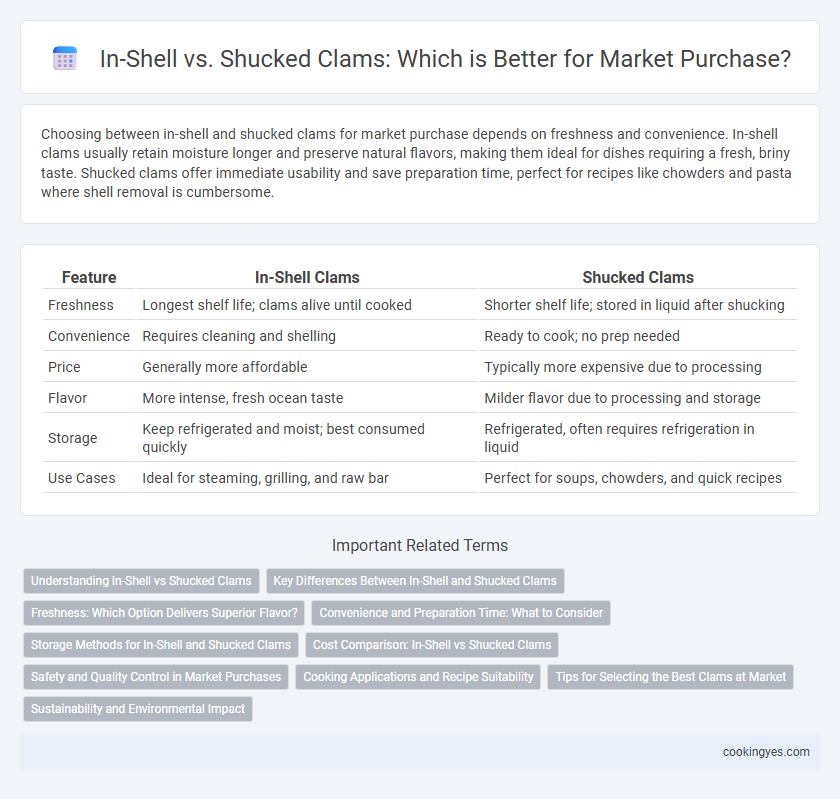Choosing between in-shell and shucked clams for market purchase depends on freshness and convenience. In-shell clams usually retain moisture longer and preserve natural flavors, making them ideal for dishes requiring a fresh, briny taste. Shucked clams offer immediate usability and save preparation time, perfect for recipes like chowders and pasta where shell removal is cumbersome.
Table of Comparison
| Feature | In-Shell Clams | Shucked Clams |
|---|---|---|
| Freshness | Longest shelf life; clams alive until cooked | Shorter shelf life; stored in liquid after shucking |
| Convenience | Requires cleaning and shelling | Ready to cook; no prep needed |
| Price | Generally more affordable | Typically more expensive due to processing |
| Flavor | More intense, fresh ocean taste | Milder flavor due to processing and storage |
| Storage | Keep refrigerated and moist; best consumed quickly | Refrigerated, often requires refrigeration in liquid |
| Use Cases | Ideal for steaming, grilling, and raw bar | Perfect for soups, chowders, and quick recipes |
Understanding In-Shell vs Shucked Clams
In-shell clams retain their natural shell, offering extended freshness and a longer shelf life, making them ideal for markets focusing on quality and aroma preservation. Shucked clams provide convenience by removing shells, allowing immediate use in cooking and faster preparation times, preferred in restaurants and consumers seeking ease. Selecting between in-shell and shucked clams depends on factors like storage capabilities, intended culinary use, and desired freshness level.
Key Differences Between In-Shell and Shucked Clams
In-shell clams retain their protective shells, preserving natural freshness and extending shelf life, making them ideal for buyers seeking maximum flavor and longer storage. Shucked clams are pre-removed from their shells, offering convenience and ready-to-use freshness but with a shorter shelf life and greater susceptibility to spoilage. Market buyers should balance the need for ease of use with freshness goals when choosing between in-shell and shucked clams.
Freshness: Which Option Delivers Superior Flavor?
In-shell clams preserve their natural juices and are less exposed to air, ensuring maximum freshness and a richer, brinier flavor compared to shucked clams. Shucked clams, while convenient, often lose some of their delicate taste due to processing and storage. Selecting in-shell clams guarantees superior flavor, especially when sourced from reputable fish markets or sustainable fisheries.
Convenience and Preparation Time: What to Consider
In-shell clams require more time for cleaning and preparation, making them less convenient for quick meals, while shucked clams offer immediate usability with minimal effort. Shucked clams are ideal for recipes needing fast incorporation, such as pasta or chowder, reducing prep time significantly. Consumers prioritizing convenience often choose shucked clams despite a slightly higher cost due to saved cleaning time and ease of use.
Storage Methods for In-Shell and Shucked Clams
In-shell clams should be stored in a breathable container such as a mesh bag or a bowl covered with a damp cloth, kept in the refrigerator at 35-40degF to maintain freshness and avoid suffocation. Shucked clams require refrigeration in an airtight container submerged in their own juice or clean saltwater, ideally at 32-38degF to preserve flavor and prevent bacterial growth. Proper storage extends shelf life, with in-shell clams lasting up to two weeks and shucked clams viable for three to five days.
Cost Comparison: In-Shell vs Shucked Clams
In-shell clams generally cost less per pound compared to shucked clams due to minimal processing requirements and lower labor costs. Shucked clams command a higher price reflecting the added value of convenience and ready-to-cook preparation. Market buyers should weigh the price difference against preparation time and usage needs when choosing between in-shell and shucked clams.
Safety and Quality Control in Market Purchases
In-shell clams maintain a natural barrier that protects against contamination and helps preserve freshness, making them a safer choice for market purchases when proper storage temperatures are ensured. Shucked clams require stringent quality control measures, including rapid processing and refrigeration, to prevent bacterial growth and maintain freshness. Consumers should verify source certifications and expiration dates to ensure safety and quality when purchasing shucked clams.
Cooking Applications and Recipe Suitability
In-shell clams preserve natural juices and flavor, making them ideal for steaming, grilling, and dishes requiring fresh, tender meat like clam bake or chowder. Shucked clams offer convenience and uniform size, perfect for recipes needing quick incorporation such as pasta sauces, dips, and stuffing without extending cooking time. Choosing between in-shell and shucked clams depends on recipe demands for texture, cooking duration, and presentation style.
Tips for Selecting the Best Clams at Market
Choose fresh clams with tightly closed shells or those that close quickly when tapped, indicating they are alive and fresh. Avoid clams with cracked or damaged shells and any that emit a strong, unpleasant odor. Look for clear labeling on the origin and harvest date to ensure quality and sustainability.
Sustainability and Environmental Impact
In-shell clams offer greater sustainability compared to shucked clams as their shells protect the marine ecosystem during harvesting, reducing habitat disruption and promoting natural regeneration. Shucked clams often involve more intensive processing with higher energy consumption and increased waste from discarded shells. Choosing in-shell clams supports ecological balance by minimizing environmental footprint and preserving clam populations.
In-shell vs Shucked for market purchase Infographic

 cookingyes.com
cookingyes.com